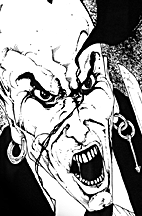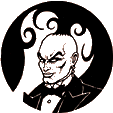| HOME | BOOKS | COMICS | RECORDS | NEWS | PEOPLE | PICTURES | ORDERS | HISTORY | office@savoy.abel.co.uk |
 | Hard Core Horror 1-5 r e v i e w e d b y C o l i n D e S u i n n Speakeasy 116 (1990) |
 THERE IS, OF COURSE, true independence among the independents. David Britton's Hard Core Horror is an extraordinary work that simultaneously indicts and explodes the presumed conventions of the comics medium. Iconoclastic in the precise historical sense, Britton's script disregards and suspends questions of aesthetic taste as an irrelevance; he's concerned with greater things, with mining that rich seam of uncolonised space within the skull. That's what's truly terrifying about Hard Core Horror; atrocity is presented simply as an incidental fact, and the onus of judgemental condemnation is placed directly on the audience. It's perhaps this demand that's generated such unwarranted hostility towards Savoy; comics are hardly distinguished by their intellectual and moral demands upon their readers. Then, too, the narrative thrust draws favourable, if erratic, comparison with de Sade and Bataille, though its (flawed) ambitions reach beyond either. THERE IS, OF COURSE, true independence among the independents. David Britton's Hard Core Horror is an extraordinary work that simultaneously indicts and explodes the presumed conventions of the comics medium. Iconoclastic in the precise historical sense, Britton's script disregards and suspends questions of aesthetic taste as an irrelevance; he's concerned with greater things, with mining that rich seam of uncolonised space within the skull. That's what's truly terrifying about Hard Core Horror; atrocity is presented simply as an incidental fact, and the onus of judgemental condemnation is placed directly on the audience. It's perhaps this demand that's generated such unwarranted hostility towards Savoy; comics are hardly distinguished by their intellectual and moral demands upon their readers. Then, too, the narrative thrust draws favourable, if erratic, comparison with de Sade and Bataille, though its (flawed) ambitions reach beyond either. Centred on Lord Horror, who's as old as the century and serves as its symbolic mirror, Hard Core Horror broadly details the period 1933 -1945, from Hitler's investiture as Reichkanzeller to the appalling consummation of the Holocaust. Further, Britton conflates Horror's character with that of William Joyce, the notorious Nazi sympathiser and English traitor, an audacious metaphor that both consolidates the period and allows the exercise of a ferocious surrealism. We're passive witness as an envious Churchill plots murderous revenge against bitter rival Horror, who's compromised 'Little Winston' both politically and in his pursuit of love. Perceptive starlet Jessie Matthews is irresistably drawn by Horror's charismatic integrity. A gnomic, Borges-like psychology informs Britton's characterisation and makes palpable his sense of period. The brooding figure of Horror's brother and part-time psychopath James Joyce (!) is perfectly in congress with the actual author's monomania, while Horror's Lancashire campaign and meeting with a nightmarish Arthur Askey is precisly focussed on Britton's muscular and colloquial dialects. Finally, forced to flee Hitler and Berlin, Horror is again quickly disillusioned. Hitler's means to an end lacks both power and vision and is rooted only in the banal squalor of Auschwitz; Genocide as mere statistic. And finally, it's the mute power of these statistics that reduce an appalled and imprisoned Horror to an impassioned silence. But such a bald plot summation doen't sufficiently address how Britton treats and realises his vision. Certainly, conventional format assumptions prove inadequate to his purpose. The narrative of Hard Core Horror is further complicated by the inclusion of a separate but related Lord Horror text that book-ends each issue. Drawing the concept of Horror as Zeitgeist of the century to its logical conclusion, this densely mythic and cure-all text charts Horror's eventual apotheosis and demise. The circle closes; the serpent swallows its tail and climaxes. And in addition, the texts are overlaid with kaleidoscopic photo-montages that dispassionately equate philosophical and literary references with atrocity stills and snatches of then contemporary popular song. It's this relentless ambition that is the series' most glaring weakness. Britton simply overreaches himself and attempts to force the comics medium to bear a textual density that it simply can't accomodate. What gains clarity and resolution in the context of a novel refuses an easy transfer to the comics page. Though flawed, Hard Core Horror's total effect is one of some frenzied synaesthesic assault; we're remorselessly drawn into the very fabric of Horror's psychescape. Britton simply doesn't permit his audience the cosy banality of the stylized quirkiness that's normally perceived as 'experimental' in comics. No anodyne serial killers here. Horror's prejudices are ugly and specific and won't succumb to corporate comicdom's distaste. And artist Kris Guidio's brutally powerful iconography further consolidates the Brechtian alienation effect that pushes Hard Core Horror out on a (gloriously decomposing) limb. It's an art that joyously kicks its boot in the face of commercial slickness; bold caustic blacks that isolate a glaring nothingness into deliquescent flame (Kris loves candles) and a teeming universe of fetishistic icons. It's perhaps forensic honesty qualifying Britton's complex tapestry of love, epiphany and final disillusionment that disturbs. Like Bergman's similarly harrowing Cries and Whispers, Britton's close and unbearable scrutiny elevates the agony of Horror's passive participation in the Holocaust into a work of tremendous power. Issue five's King Horror: Zero (illustrated by John Coulthart) makes explicit the inadequacy of measured, considered response. A stark succession of tableax detail Auschwitz, and the intentionally blank captions demand personal, direct emotion. It's light-years away from the kitsch allegory of Spiegelman's Maus. Total horror is, conversely, individual horror. The sentiments of John Donne's 'Each man's death diminshes me' find stark and appropriate translation as pitiless scientific notation in the separate narrative and montage sections; the Kabbalistic notion of man as the universe reduced to astronomical and microscopic formulae, death as a simple commodity. The scope of Britton's achievement bears justifiable comparison with Hans-Jürgen Syberberg's magnum cinema opus Hitler: A Film From Germany. There too, there is an exacting cultural reclamation of theme and material previously considered intractable to creative expression. Hard Core Horror ; quite simply, there aren't any precedents.
Rating—Scalding: The top, the very top |
| Main Comics Page | Lord Horror | Meng & Ecker | Other Comics | Articles | The Reverbstorm Appendix | Links |